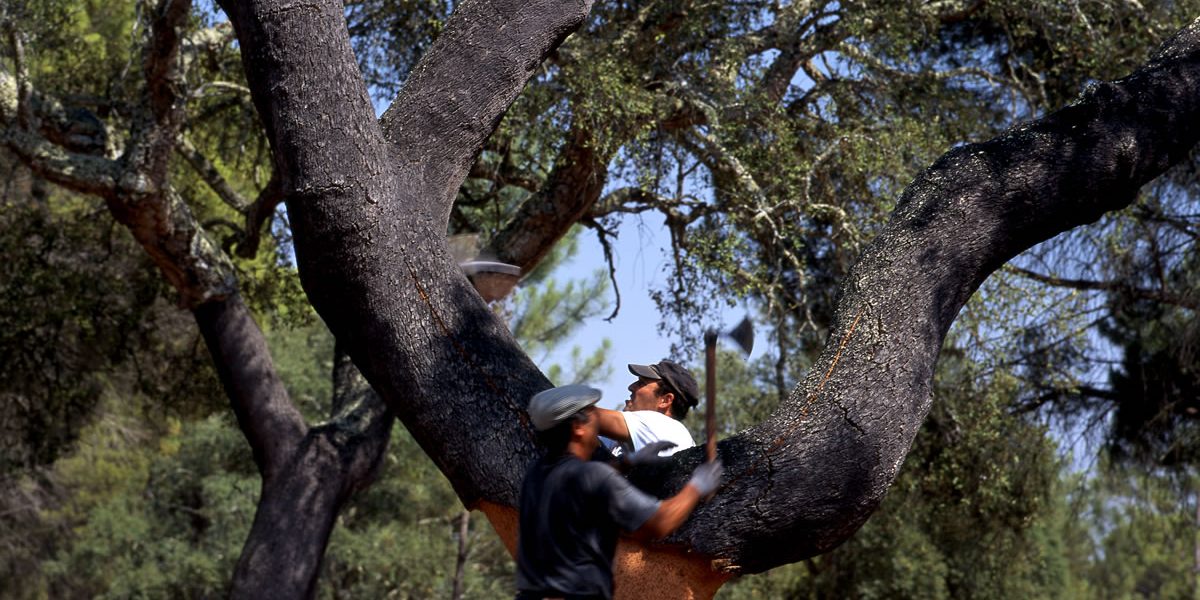Cork is derived from the bark of the Cork Oak tree (Quercus Suber). The bark gets stripped every nine years and regenerates so the tree never dies. Here are some of the amazing environmental benefits of cork due to its natural properties and the ecosystem it promotes:
- Carbon Sequestration – Cork oak trees, which grow predominantly in Mediterranean countries (in particular Portugal and Spain), are one of the best-known carbon sinks in the world and the cork is completely renewable because of its amazing ability to regenerate. The bark, (what we know as cork), contains high levels of suberin, a waxy substance that acts as a natural carbon sequestration agent, locking away carbon dioxide from the atmosphere and of course the cork oaks themselves sequester carbon and can live to over 180 years old.
- Biodiversity – Cork forests are home to a diverse range of flora and fauna and are home to a unique ecosystem that not only provides a habitat for endangered species such as the Iberian Lynx and the Barbary Macaque but also for an incredible range of insects, birds, and other small animals. The preservation of these forests helps to maintain ecological balance and promote biodiversity.
- Water Conservation – Cork forests act as natural watersheds, absorbing rainfall and releasing it slowly into the ground, thus preventing soil erosion and reducing the risk of flooding. These forests also help to replenish groundwater reserves and regulate water quality, making them an essential component of the local ecosystem as well as preventing desertification of arid areas such as those found on the Mediterranean rim.
- Waste Reduction – Cork is a highly recyclable material, and cork products can be reused or repurposed in various applications. For example, cork bottle stoppers can be ground up and used as mulch or as a soil conditioner, while cork flooring can be recycled into insulation or composite decking. Recycling cork helps to reduce waste and conserve resources.
- Energy Efficiency – expanded cork has excellent insulation properties, which makes it an ideal material for thermal and acoustic insulation. Expanded cork can be used to insulate walls, ceilings and floors to reduce energy consumption by providing a natural barrier against heat loss. Expanded cork insulation is also an excellent natural alternative to synthetic insulation typically providing similar levels of insulation, but with none of the environmental damage.
- Renewable Resource – Cork is a 100% renewable resource, as the bark of cork oak trees can be harvested every nine years without harming the tree. This makes cork a more sustainable alternative to materials such as plastic, which are derived from fossil fuels and have a significant environmental impact. Furthermore every granule of cork removed from the tree is used in one way or another and nothing goes to waste
- Low Environmental Impact – the production of cork has a low environmental impact compared to other materials such as plastic or aluminum. Cork production involves minimal processing and does not require large amounts of energy, water, or chemicals. Cork production also generates fewer greenhouse gas emissions than other materials, making it a more sustainable choice.
So there you have it – cork is a fabulous natural material which not only minimizes environmental damage, it also actively promotes a number of environmental benefits. Cork is often not the cheapest option whether it is being used for closures or insulation, but there is rarely a more green alternative to cork wherever it is being used.








